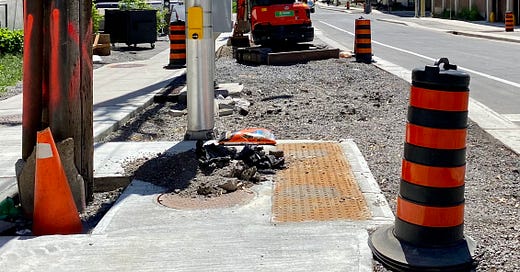Fix City Finances 1: Write Budgets That Everyone Can Understand
Does your City budget answer these 12 questions?
This is the first of six common sense solutions for fixing municipal finance.
$200 Billion Flying Under the Radar
Cities in Canada are big operations. Across the country, city budgets total more than $200 billion. All together, that’s over half of what the federal government spends.
Yet municipal finance largely flies under the radar. Outside of Toronto and its big budget gap, few outsiders scrutinize local finance the way that federal or provincial finances get looked over.
Lack of scrutiny is a problem. Spending by cities is what often affects people most directly. Road repairs, garbage, emergency services … just a few of the responsibilities of cities.
Are taxpayers getting good value for what they spend on these critical services?
Budgets Are About Priorities
Municipal budgets are hard to read. In fact, it's close to impossible for many people to understand their city budget. And they seem to be getting more complex and less transparent every year.
The average citizen doesn’t engage in the city budget process, in part, because budgets are written to make people feel unqualified to comment.
But it doesn’t need to be complex. Everyone should be able to get involved.
Budgets are about priorities. Budgets can be presented in a way that makes meaningful public engagement possible.
We are ready to work with cities that want to translate their budgets from Finance into English. But in many cities, it will be up to citizens to demand better budgets.
Ask for Something Better
Many city budgets run to hundreds of pages, but don’t answer the most basic of questions.
We’ve boiled municipal finance down to 12 essential questions that every city budget should answer. See those questions below.
If your city budget doesn’t answer these, ask your Councillor or representative to have city hall provide that information. No one needs to be an expert to ask those questions; you just have to care.
If enough people ask, maybe cities will start producing budgets that everyone can understand.
12 Questions Your City Budget Should Answer
How large is the total city budget, and how much is this per person or household?
How much does the average household pay in property taxes, and how does this compare to the rest of the province or other jurisdiction?
How much flexibility is there in the budget for spending on new priorities? How could the city raise additional revenues, other than by increasing property taxes?
How much capacity do we have to take on debt for big capital investments?
Does the budget clearly lay out the level of reserves by category, and identify whether there are any surpluses or deficiencies in reserves?
How much do we spend on “high-visibility” city services (e.g., snow removal, potholes, wading pools), and if we wanted to achieve a higher standard of service in any of those areas, how much would it cost?
How much are we investing in transportation capital projects, and how is this divided between building new roads, widening roads, fixing roads, new public transit, upgraded transit, and building bike lanes and sidewalks?
For capital projects listed in the budget, is more detailed information provided elsewhere?
What are the future cost or revenue implications of the infrastructure investments we make today?
How much revenue do we raise by district (or ward, borough, …)? How does this compare to spending by district?
How much is the city spending on climate action?
Is financial data available to the public in electronic format?







I appreciate you trying to make first steps in helping the average person get more involved in the budget process, but this article falls victim to one of the problems: the words used. Big words are used to obscure, confuse and alienate.
Consider these questions:
"How much capacity do we have to take on debt for big capital investments?"
"What are the future cost or revenue implications of the infrastructure investments we make today?"
"Does the budget clearly lay out the level of reserves by category, and identify whether there are any surpluses or deficiencies in reserves?"
Right away, you're using the terminology meant to keep people away and disinterested instead of writing in common, everyday words. For example, why isn't the first sentence "How much money can the city borrow for big construction projects like buildings, highways or parks? What could happen if we borrow that much?"
Another question I often wonder about is "How much of this budget is re-invested directly into our community?"
For example, Waste Management (WM) is contracted to do many garbage & recycling contracts in municipalities across Canada through many multimillion dollar tenders. If 35% to 38% of every dollar given to that Texas-based company is "gross profits" then how much of that spending actually directly benefits our community? Moreover, could such information be considered or incorporated into future procurement processes? Perhaps the amount of federal, provincial and municipal property tax the bidding organization(s) contribute back to our society could somehow be a rated requirement. ;-)
(source: https://www.macrotrends.net/stocks/charts/WM/waste-management/profit-margins)